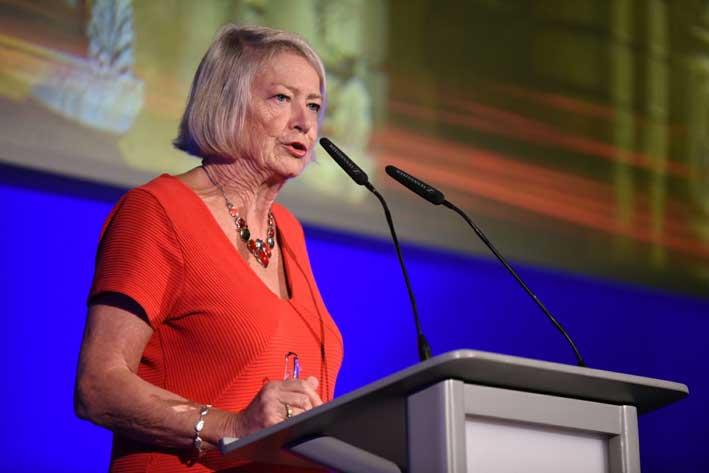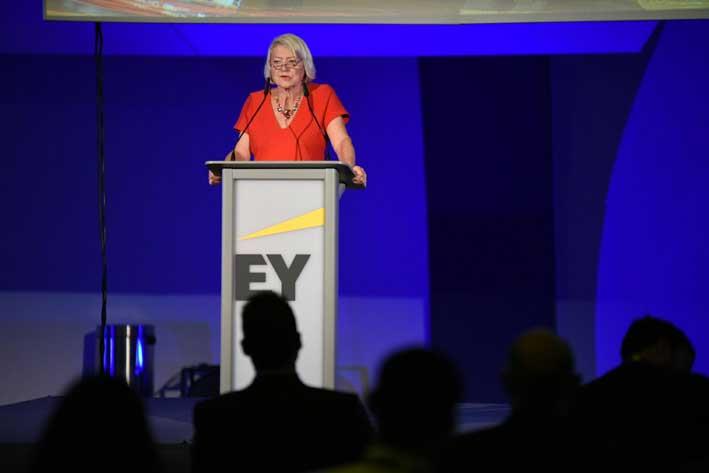Veteran journalist and former BBC chief news correspondent Kate Adie has taken aim at the emergence of “citizen journalism” tying it into the relatively new buzzword of “fake news”.
“Citizen journalism is leading to the amount of gossip leaking into new-sites, and has also helped in the spread of propaganda. RT ‘news’ agency is funded directly from Putin and his colleagues, it is a propaganda outfit and is falsely presenting itself as a news channel. “
She pointed out that the key difference between so-called citizen journalists and trained journalists is the activity of fact-checking. It is the practice of checking with multiple sources, speaking to people on the ground and getting to the bottom of stories.
Adie was addressing the annual EY attractiveness survey event. Her presence on the island comes just over a week after journalist Daphne Caruana Galizia was brutally murdered through the use of a car bomb.
“In some ways this explosion of technology has not led to an improvement in some areas. What is fake news? Some of it is the mix coming from those popular social media sites were gossip and rumours is mixed into news sites.
“Fake news is what President Trump does not like. It is a very interesting definition. News never pleases everyone and comes from all corners of the population from a democratic state. Mr Trump is possibly one of the more dangerous thing in the media world, where he is leading his supporters to believe that the entire mainstream media are putting up fake news.
“It is terrifying. Fake news shows a kind of contempt to the democratic system. The system has relied on free speech, the importance of the individual citizen and the individual citizen’s rights.
“Democracy needs the press. I feel this so strongly, you cannot have a state which calls itself a democracy without a free press. That press needs to be supported, even if you don’t like its views, it has a job. In a democracy, it is the old adage that the press tells truth to power. We try to fulfil it and it is enormously important.

“We have to deal with the technology, the demand of business, the lure of money. We have to deal with so much because our job is not really about making money, we all like to make money but journalists are there to tell truth to power. Journalists need support, encouragement and they need information. They need the will of the people behind them. Even if you do not agree with everything that is printed or said, journalists are there trying to do a good job.”
“You are a democracy, you are part of the EU, the country is doing well. Let us hope in the future, and I am a stranger but please let me say this, please support your press and the right to the support of freedom. “
She recalled a story from years prior when she arrived in Malta by helicopter to write about the British Navy in Malta, when a naval officer on the ground commented “Oh God, you’re one of them..”, and when asked to explain, the officer said “you’re a woman, aren’t you?!”
Adie used this story to illustrate how society has changed, how when she started out men were not accustomed to seeing female journalists, let alone ones who cover military stories.
She spoke of her focus on defence matters within the British military.

“One goes to cover wars not out of choice, but because it is necessary because ugly things happen in life.” She quipped that just like one must cover war zones, covering dog-shows and miss world competitions also had to be covered, adding that the most difficult were the miss world shows.
We are living in a world of change, Adie commented. She recounted multiple stories on how as technology progressed many facets of life, the media getting access to certain technologies has not been met with much approval.
Adie was one of the first journalists able to transmit live a major military operation in a middle-eastern desert, which she recounted made army officials quite uneasy.
“What is happening now though is much greater change as you well know. It is a kind of violent change – because I looked up the word disruption and found in many dictionaries it being described as ‘violent change’”.
She lamented on the ever-growing inequality plaguing the earth, describing it as “disruptive change”.
Adie’s continuous reference to disruption is to link the EY attractiveness survey theme – Thinking without the box: disruption, technology and FDI.